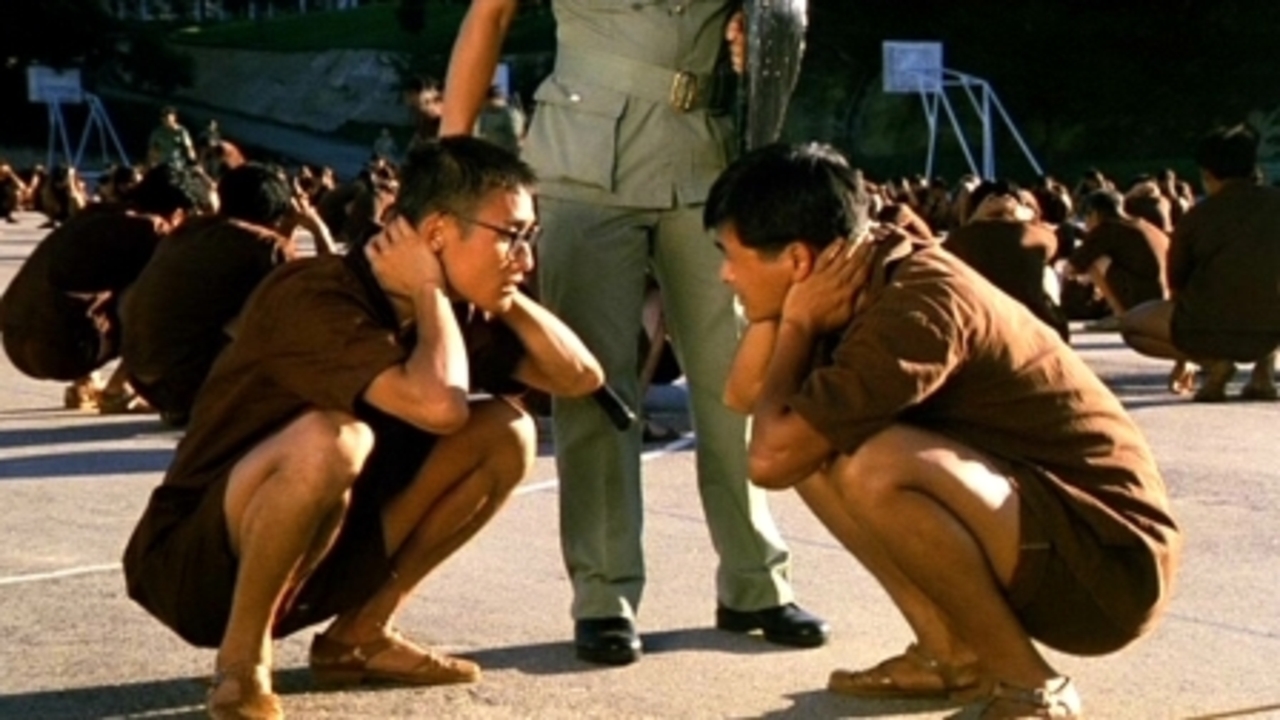
 Well, let’s see… Ringo Lam directs Chow Yun Fat and Tony Leung Ka Fai (who is apparently in every HK movie I’ve seen recently) in your basic "newbie prisoner under the wing of a more experienced con" story. The setup is really basic; Lo Ka Yia (Tony Leung) is naive, wet behind the ears and gets sent to the big- house for manslaughter. There, he is befriended by wise- cracking, experienced Mad Dog (Chow Yun Fat.) The rest of the movie deals with the two buddies struggles against an unhinged Triad boss and a constantly pissed- off head of security.
Well, let’s see… Ringo Lam directs Chow Yun Fat and Tony Leung Ka Fai (who is apparently in every HK movie I’ve seen recently) in your basic "newbie prisoner under the wing of a more experienced con" story. The setup is really basic; Lo Ka Yia (Tony Leung) is naive, wet behind the ears and gets sent to the big- house for manslaughter. There, he is befriended by wise- cracking, experienced Mad Dog (Chow Yun Fat.) The rest of the movie deals with the two buddies struggles against an unhinged Triad boss and a constantly pissed- off head of security.
What this film lacks in originality– Well, to be honest, there really isn’t any, in terms of the basics at least. Taken at face value (I.E. if you read the script cold) the characters and the kernel of the plot are prison film stereotypes to the nth degree. The pivotal character, Mad Dog for instance, is basically a less vulnerable version of Paul Newman’s character in the classic Cool Hand Luke (One of the two or three best prison movies of all time and Newman’s finest performance if you ask me…)
The thing is, it just doesn’t matter. In this film director Ringo Lam takes the barest thread and weaves yet another dark masterpiece. Again, Lam serves up a vitally intense work. From the opening scene the feeling of danger is ever- present. The tension is built as the peril steadily grows until it bursts forth in the brilliantly cathartic finale. Both literally (the cell in which the climax occurs is flooded by a high pressure hose) and figuratively the end of this film resembles a levee breaking, frustrations and anger flowing freely from both of the capable leads.
Actually, the above is an understatement. "Capable" is far too weak a term to describe the performances delivered by the two stars in this film. Chow Yun Fat, as you would expect, is amazing. He plays Mad Dog with an easy, worldly charm that is the perfect foil to the unbridled naiveté of Tony Leung’s Lo Ka Yia. When Mad Dog finally loses control, Chow shifts gears flawlessly and dives headfirst into the revenge- driven madness that captures his character during the films final reel. If you are wondering why some refer to the God of Gamblers star as the "God of Actors" this film is a good place to start.
Tony Leung, on the other hand, doesn’t have as broad a palette to play with in his role. He doesn’t have the scene stealing opportunities that Chow does, but he does perform well with what he is given. For the most part his performance is nicely understated, Leung’s Lo Ka Yia is normally soft spoken and timid. This "normal" mode is so well established that breaks from this pattern are received by the viewer like a slap in the face. The one major breakdown his character faces in this film is a skillfully played scene. All in all a fine performance, not the equal of Chows, but fine nonetheless.
When all is said and done, Prison on Fire is an excellent film. Buoyed by the two leads and fueled by Lam’s trademark "half empty" view of the world, Prison on Fire is a film that overcomes it’s shortcomings with pure energy and human vitality.
This article was originally published on DrunkenFist.com in 2000.